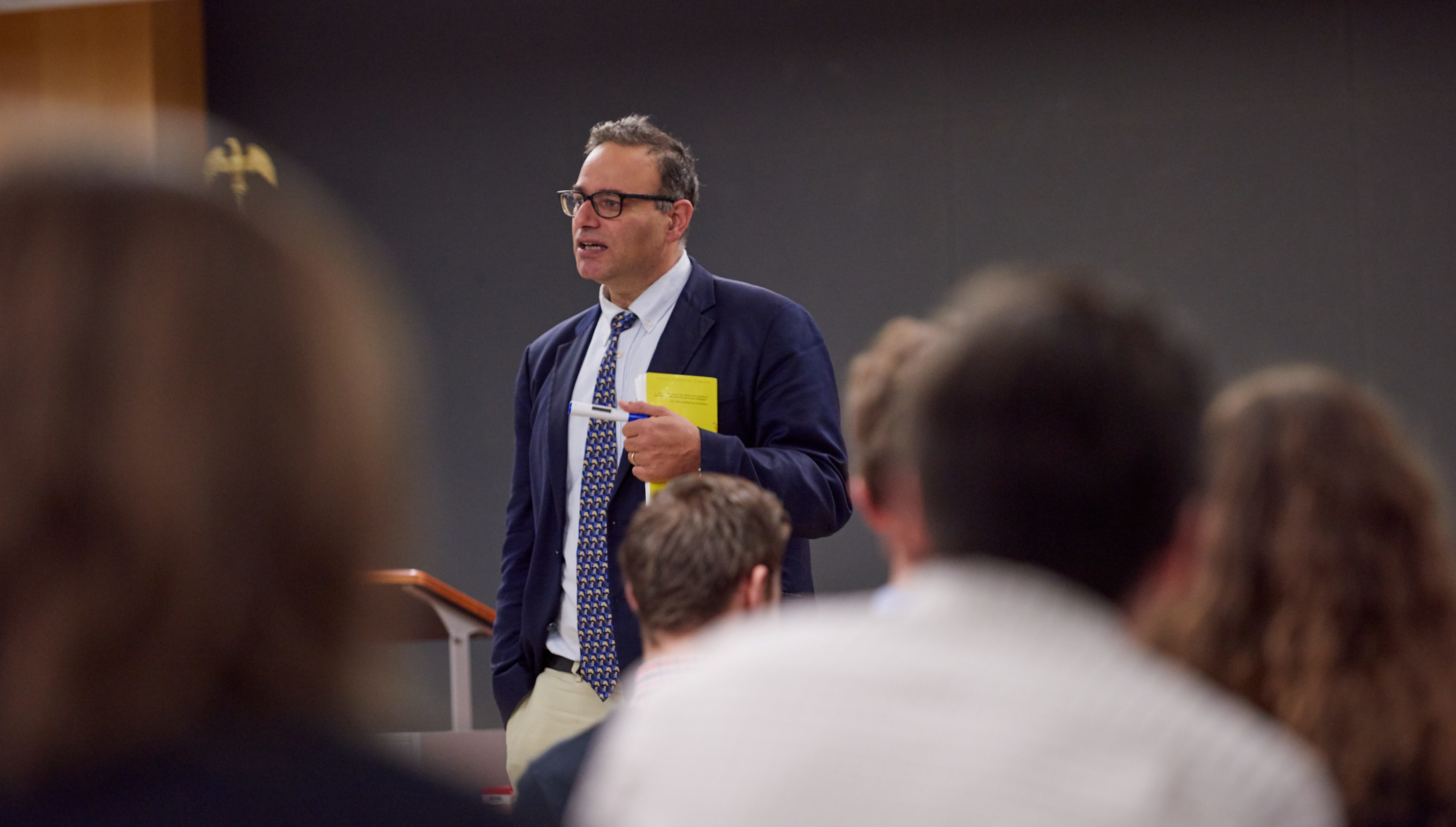King’s Hosts Dr. Khalil Habib, Distinguished Scholar of Political Philosophy
On October 12, The King’s College hosted a lecture by Dr. Khalil Habib, associate professor of philosophy and director of the Pell Honors Program at Salve Regina University.

On October 12, The King’s College hosted a lecture by Dr. Khalil Habib, associate professor of philosophy and director of the Pell Honors Program at Salve Regina University. In addition to his published work in prestigious academic journals such as Review of Metaphysics, Ancient Philosophy, and The Polish Journal of Philosophy, Habib is the co-editor of Cosmopolitanism in the Age of Globalization: Citizens without States.
The lecture was part of a year-long series of lectures, symposia, and debates organized by Dr. Paul Mueller, assistant professor of economics at The King’s College. Throughout the year, King’s will host two senior scholars and two to four junior scholars per semester, and the emphasis will be on connecting these scholars with students and faculty in both formal and informal settings. Besides the speaker series, these grant-funded events also include a student reading group and student research assistant hours, among other things. This grant expands upon a similar grant Mueller received in 2017-18.
Habib’s lecture explored the rise and fall of political regimes through two works of the ancient Athenian playwright Aristophanes: The Birds and The Clouds. In particular, Aristophanes’ The Birds foreshadowed the political decline of Athens from a model republic of free citizens to a centralized, imperial state. Though the Athenian Empire was initially developed pragmatically, as a response to the Peloponnesian War, it degenerated into tyranny. Ancient observers came to regard regime change as tragic yet inevitable. Habib argued that this attitude is reflected in both The Birds and The Clouds. Both, Habib said, highlight the enduring tension between the desire for political liberty, as found in republics, and the need for political efficacy, as exemplified in empires.
Habib also commented on the pertinence of this issue for the Framers of the U.S. Constitution, who were well-versed in ancient political disputes. Though divided into Federalists and Antifederalists, both sides of the debate recognized that as America grew, it would have to resist the inclination toward empire. Nevertheless, the Federalists remained optimistic. They believed that the new national government would have sufficient power to enforce federal law, yet still permit liberty to flourish in the states. By contrast, the Antifederalists suspected that any centralized government would gradually monopolize power and devolve into empire. Habib thinks that these concerns remain valid today, and that the increasingly concentrated federal authority threatens the rights, freedoms, and democratic representation of American citizens. After all, the trajectory of regime change is irreversible; no empire has ever been observed to revert to a republic.
Mueller praised the discussion, saying, “Dr. Habib’s lecturing style was quite engaging. There were so many questions we ran out of time at the end of the talk. I’ve had several students tell me they were fascinated by the ideas in the talk and wanted to learn more about them.”
In the evening, The King’s College sponsored a symposium at the Princeton Club where Habib, select faculty and staff, students, and guests attended a dinner. The conversation centered around the development of legal rights, with reference to political philosophers as diverse as Aristotle and Eric Voegelin. Attendees listened raptly as Habib explained how Enlightenment thinkers such as Hobbes and Locke built a notion of rights on concomitant duties that is consistent with biblical ethics. “For example,” Habib said, “my right to life necessarily entails an understanding that I must respect the lives of others.”
Unfortunately, these duties are neglected in the modern assertion of rights as mere selfish license. This false understanding has affected a breakdown of political consensus, as evidenced in the recent acrimonious controversy surrounding a Supreme Court nomination. Still, Habib believes that America is not beyond redemption, especially given his experience as an immigrant: “I’m not giving up on this country. I’ve lived elsewhere, and I think the problems we are facing right now are not the end of the Founding. America may be the only rights-based country, and there’s something really special about this country.”




